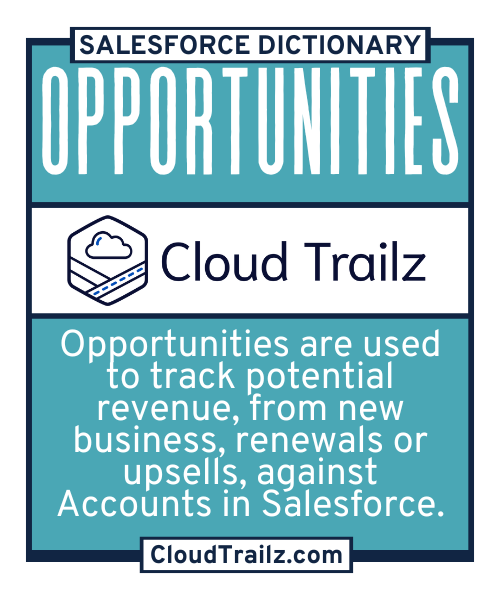
Opportunities
Overview
Opportunities are used to track and manage potential revenue-generating deals or sales that your organization is pursuing. They are a core part of Sales cloud (and others) and play a crucial role in managing the sales process.
How Are Opportunities Used?
Opportunities reflect potential deals in Salesforce. Features like stages, forecasting and Opportunity teams allow reps to track deal progress, project sales, manage their pipeline and work together as a team to win business. Information from lost deals also enables sales teams to better understand their potential customers and tailor future sales strategies to win more.
What is the Benefit?
Opportunity Teams
Opportunity Teams allow Sales teams the flexibility to assign multiple reps to a single opp. They can then share revenue attribution or commission percentages directly in Salesforce. It enables collaboration and speeds up the process of closing out deals.
Pipeline Inspection
Pipeline Inspection helps give quick insight to individual reps or Opportunity Teams pipeline. You can see rollups of Open Pipeline (amount and count), deals that moved into the filtered date range, deals that have moved out, Closed Won amount and other values as determined by your forecasting configuration.
Forecasting
Forecasting can be enabled in salesforce to track your opportunity pipeline. You can create hierarchies, enable adjustments by managers or owners (that don’t reflect on the Opportunity record) and display quotas.
Sales Process
Deals are categorized into stages that reflect their progression: demo, negotiation, closed-won, closed-lost, etc. This helps in managing and monitoring the sales process effectively. This is the place to capture detailed information including potential revenue, expected close date, account details, key contacts, and any relevant notes or attachments. This is also the ideal place for for collaboration among sales team members and other departments. Notes, tasks, and updates related to Opportunities can be shared which ensures everyone involved has up-to-date information.
Common Use Cases of Opportunities
| Use Case | Roles | Scenario | Outcome |
|---|---|---|---|
| Opportunity Management | Sales Rep | Track Deal Progress |
|
| Customer Growth | Account Manager | Upsell/Expansion Deals |
|
| Service Tracking | Service Rep | Case Resolution |
|
Common Challenges
#1 – Data not flowing from Lead to Opportunity
Resolution
Check the field mappings for conversion on Lead, ensuring that data types and values match across objects. If accurate, verify the user has the appropriate access to view the field in Salesforce.
#2 – Users can’t see opportunities they don’t own
Resolution
Verify the Sharing is correct for Opportunity and that the role hierarchy is in the correct format. Add sharing rules or adjust the role hierarchy as necessary to ensure users can see the appropriate records.
Trailhead Modules
| Module | Description | Estimated Completion Time | Difficulty Level |
|---|---|---|---|
Working Opportunities |
|
~1 hr 10 mins | Beginner |
Build Forecasts with Opportunities |
|
~30 mins | Beginner |
Who is Impacted?
Sales Teams
Reps can use Opportunities to track their deals, manage the sales process, and update the status of each deal, helping them stay organized and focused.
Sales Managers
Sales Managers can the performance of their team, track the progress of deals through the sales pipeline, and use Opportunity data for forecasting and setting quotas. Opportunities also allow them to evaluate team performance and make strategic decisions.
Marketing Teams
Marketing Managers use data from Opportunities to assess the effectiveness of marketing campaigns and initiatives. This helps them understand which campaigns drive the most revenue and how leads convert into deals. Campaign Managers can analyze the impact of their campaigns on Opportunity lifecycle and success rates. Insight like this should drive refined targeting and messaging strategies over time.
Support Teams
Support reps can refer to Opportunity records to understand the background and details of customer interactions prior to their engagement with Support.
C-Suite
Executives can rely on Opportunity data for high-level revenue forecasting, performance analysis, and strategic planning.
Developers/Admins
Developers and Admins together can work with Opportunities to drive automation and ensure deal closure stays efficient and successful.